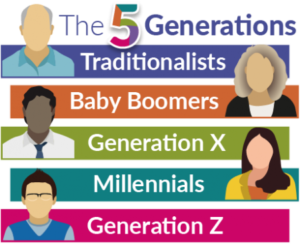There has never been a time when the UK’s workforce has been more diverse. Encompassing different working patterns, part-timers and remote working to name but a few. With all this to contend with, it is no wonder that employers whilst viewing their employees as individuals sometimes tend to treat them all the same. Maybe not realising that as each Generation passes the way individuals work and are motivated, changes.
We have been looking at the different Generations in this diverse workplace. How identifying which groups you have, and knowing their different foibles can improve the company’s dynamic and therefore the success of the business. The way the diverse Generations in the workplace are dealing with the increasing dependency on technology with social media, online training and remote working.
But how do the different Generations deal with this increase in technology-based working?
How prepared are you to harness the different Generations in the workplace? Do you understand how the increasing dependency on technology with social media, online training, Artificial Intelligence and remote working will impact your teams?

With the growing presence of artificial intelligence and machine-based operations, we believe that people skills (soft skills, people management skills and those that can’t be done by a computer) will become increasingly imperative for corporate culture. We anticipate that businesses will be looking for its employees to do what machines or robots cannot. We are conscious that as the workforce transforms through digitalisation and AI, we expect the value placed on people skills to increase. As such, the ability to communicate well and to manage conflict will become key requirements.
At SYLO | Beyond HR. we are already finding that our most popular tailored or 12 month programme of open workshops are where there is a focus on communication skills and how to manage conflict.
Teamwork, collaboration and problem solving will also become critical needs for businesses in the near future, and y using emotional intelligence psychometric testing both for recruitment and employee development.
Established companies are seeing their whole structure changing. They could have employees who have been with the company a long time as well as new apprenticeships and everything in between. As the diverse workforce becomes more transitional the expectation of a “Job for Life” with a company pension, company car and 40 years of working is changing and has been for the last 20 – 30 years. It is becoming more pronounced as the different Generations of employees are flexing their need to work smarter, as well as harder, to have the work life balance they want and deserve.
Newer Companies are trying to embrace a more diverse but flexible workforce, with employees looking for a package rather than just a salary. With flexitime, working remotely on the increase, people working longer, more accommodating parental and carer packages, an increase in Apprenticeships and Graduates looking for an Employer of Choice, the emphasis on how to motivate individuals and retain your best employees is becoming more important.
Do you know what motivates your employees?
Your workforce is diverse in all areas, which is a challenge to manage anyway, throw into the mix the motivational needs of the different Generations and it’s difficult to know what motivates which employee.
Now we all know that each employee is an individual. What motivates one 30 year old in your workforce may not be what motivates another, due to background, current living situation and desire to achieve. So, whilst these groupings are broad strokes, what may motivate the individuals in each of the Generations Group?
Today, many workplaces are composed of five generations:
- Traditionalists—born before 1946 (over 70 years old)
- Baby Boomers—born between 1946 and 1964 (between 55 and 70 years)
- Generation X—born between 1965 and 1976 (between 45 and 55 years)
- Generation Y or Millennials—born between 1977 and 1997 (early 20’s to early 40’s)
- Generation Z—born after 1997 (those coming into the workplace currently including Graduates)
People no longer expect to work 9-5, or spend 40 years in the same job. Unemployment is low and the freelance economy is booming. We are working later in life so workplaces see 5 generations all working together – the 5G workforce. Agility and emotional intelligence to collaborate and enable transformation are now critical skills. invest in systems that will help employees grow and develop, rather than transactional systems like payroll & time management. Employers are realising that a more flexible approach to the employment package with an Employee Wellbeing and Engagement Focus is the way forward to retain and motivate their employees.
That deals with the motivational aspect of employee relations, but what about the individual issues between colleagues? Is it a Generational problem? The only way to really find out is to talk it through and find solutions, maybe just making teams aware that they work differently would improve matters greatly.
To help identify and find solutions to these challenges by helping you to manage your teams effectively, we will be running a workshop specifically focussed on this area in the new year. If you would like to register your interest, please email us and we will notify you when the date has been confirmed.
Join us for The Generations Game workshop and learn how to manage all age groups from Baby Boomers to Generation Z!!
Find out how to understand the different generations in your workplace.
Please contact us here for more details of our extensive range of training via the SYLO | Beyond HR. Training Hub.